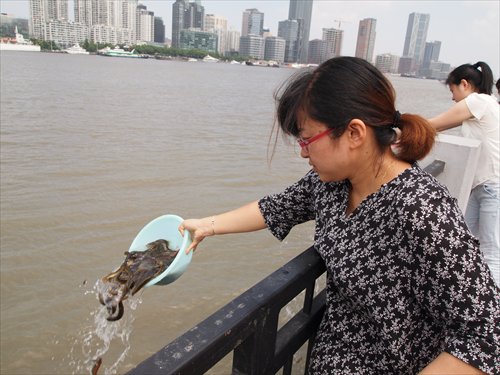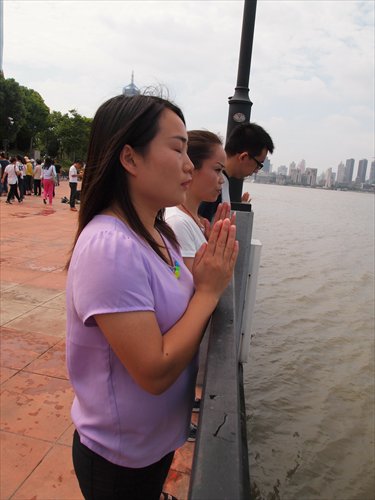HOME >> METRO SHANGHAI
Setting free the fish
By Ni Dandan Source:Global Times Published: 2015-10-28 17:58:01
Buddhist groups’ weekly rituals attract criticism

A woman releases a bowl of loaches into the Huangpu River. Photo: Ni Dandan/GT
On a sunny Sunday morning this month, on a quiet section of the riverside facing the Bund across the Huangpu River, hundreds of people could be seen chanting Buddhist sutras (Buddhist scripture), bowing and undertaking meditative walks.
While some were dressed in the brown robes that mark some Buddhist practitioners in China, the haiqing, most wore ordinary street clothes. Those wearing the robes had been ceremonially accepted as Buddhist practitioners, the others are believers who have not undergone that ritual.
Many of them recite the sutras by heart but other read from copies which are being handed out at the site. Behind the crowd kneeling before a makeshift altar were some 20 containers of live loaches (a local eel-like bottom-dwelling river fish), swimming and occasionally leaping from their cramped quarters as though they could feel they were close to freedom.
And freedom was why these people were gathered there. The loaches were to be released from their confined spaces and set free. It is part of the Buddhist philosophy that everyone should refrain from killing and should protect life. Rituals like this, setting creatures free, have been described more than 2,700 years ago in the Spring and Autumn Period (770BC-476BC).
In ancient times people performed the rituals on special occasions. But these days, believers perform these rituals more frequently, usually every week here. "We come here every Sunday morning rain, snow or storms," said Li Zi, a Shanghainese in her 50s, who has been a member of the Benefit Life Group, which organizes these liberation rituals, for three years.
Religious fervor
The group is one of a handful of similar organizations in Shanghai that bring people together regularly to set creatures free. But this declaration of religious fervor, which has involved not just loaches but catfish, turtles and snakes, has been coming under fire because some of the creatures can be a threat to local residents and can also prove an environmental problem.
Some experts are now suggesting that the Buddhist freedom rituals have to be balanced with an appreciation of the environment and public welfare.
Jing Fang (her Buddhist name) founded the Benefit Life Group four years ago with her husband, who had just recovered from a major heart surgery. The couple had not been really devout Buddhists before but had concentrated on their business, which was making millions of yuan every year.
But on the eve of her husband's operation, they came to the belief that the Buddha was calling them. "My husband had seriously damaged heart valves and the hospital warned us that the surgery would be very risky," Jing Fang said.
"The night before his operation, Kwan Yin (the bodhisattva of compassion and mercy) appeared in his dream. He has been blessed by the bodhisattva since then and we were encouraged to do something in return."
Four years ago, the couple gave up their business and, with their savings, launched the group which sets creatures free every week. The group has ballooned in size from fewer than 10 members to several thousand active members today.
Jing Fang is always open and willing to share her story and she feels that she is helping in this way not just the animals she sets free but also the lives of the members of the group.
"We commit sins from time to time but we are not often aware of that. You are accumulating merits and virtues by releasing these captured lives and such actions can make up for the sins you've committed," she explained.
In her late 30s, Yang Ling (pseudonym) is an active member of the group. She was busy at the Sunday event handing out incense sticks and making sure the loaches were kept in fresh water.
Yang became a mother last year and said she didn't know how to describe her gratitude to the group. "When I joined at the end of 2011, I was depressed because I was told by doctors that both my Fallopian tubes were blocked and without surgical intervention there was no chance of getting pregnant. I believed I must have sinned and Buddha was punishing me for this. So I joined the group to pay back the debt that I owed," she said.
Yang's experience has been widely publicized throughout the group - more than a year after she joined and volunteered her services, she fell pregnant without any medical assistance. "It was a miracle and we felt inspired," said Li Zi. "We really believe when we are setting these poor creatures free, they are carrying away diseases that our family members are or might be suffering from, or curses that have been put upon us."
When Li Zi talked to the Global Times, she was sitting at the foot of a tree in front of the crowd at the ritual, holding in her arms the 11-month-old baby of another member.
"Because of the group, we have bonded closely together. When this baby was born, she had a lotus pattern on her forehead. We believe she has been a Buddhist in an earlier life. And her parents are determined that she will be sent to a Buddhist college and become a nun," she said. The child has been a strict vegetarian since birth.

Buddhist believers on a meditative walk at their weekly gathering Photo: Ni Dandan/GT
Big business
Early every Sunday morning, Jing Fang leads members of her group to the wholesale aquatic products market on Tongchuan Road to buy loaches. She said they had come to understand that loaches had a better chance of surviving in the river rather than the crucian carp and catfish they used to buy for release.
They are well known at the market. Every time they arrive there they spend up to 100,000 yuan ($15,746) on thousands of the little fish. Jing Fang said its members contribute whatever they want.
On the accounts section, which the group updates regularly online, the donations are all listed. While ordinary members pledge between 5 yuan and 50 yuan regularly, some generous members contribute thousands or even millions of yuan a year.
Some wealthy members of the group have rented a space in an office building in Zhabei district and turned this into a hall for chanting sutras, meditating or discussing Buddhist principles.
The members of another relatively young but similar group, Hui Yuan, meet regularly away from their liberation rituals in a nunnery in Yangpu district.
Founded just last year, this group sets its creatures free in Suzhou Creek, Huangpu River and Dishui Lake in a remote part of Pudong New Area. "The founder of our group makes a big effort to make things happen. He's always the one that stays to stop anyone trying to recapture the lives that we have just freed, after we release the creatures and leave," said Dong Weihong, a middle-aged Shanghai woman.
Dong used to free fish and other small creatures on her own in streams near her home. By chance she heard about the group from a neighbor and joined up. "It was lucky getting to know so many people with the same belief. We inspire and encourage each other."
But there are people trying to sabotage these liberation rituals. They set nets above or below where the fish are being released and try to haul as many as they can back into captivity.
"We called the police a few times when we released fish into Suzhou Creek," said Wang Yueying, who was at the nunnery reading sutras with Dong. "These people have no idea how serious the sins they commit are and how bad their lives will be affected later. We try hard to convince them but they just don't have any understanding," Wang said.
But setting things free does not always appear to help people. In 2012 when some Baoshan residents went for a stroll along the riverside on Baoyang Road after supper, they suddenly found themselves surrounded by scores of red-banded snakes. The snakes, which are mildly venomous, had been released into the Yangtze River by Buddhists (the snakes can swim) but then had crawled onto land and the mass of reptiles frightened the life out of the innocent group out for a stroll.
While witnesses reported seeing more than 100 eventually only seven of these snakes survived after being rounded up and transferred to the wild life protection station in Baoshan.
Also that year thousands of dead fish were seen floating past the Bund on the Huangu River - apparently these fish had been released but the water temperature killed then.
Then in the spring of 2013, thousands of dead and rotting fish clogged up the Sijingtang River in Songjiang district. Investigations revealed that these, too, had been released by Buddhists before subsequently perishing.

A woman prays after all the fish have been released into the river. Photo: Ni Dandan/GT
Making progress
Professor Tang Wenqiao of the Shanghai Ocean University said that it was progress that these Buddhist groups now realized that loaches were the most appropriate fish to release into the waterways of the city. However, he said, it was important that they check the water quality and the physical condition of the fish before they released them.
"Theoretically loaches are strong survivors. But if they have been damaged that will reduce their ability to survive in a new environment. Many of the loaches sold in Shanghai have been transported all the way from fishponds in Hubei and Hunan provinces. It's highly likely that they might have been damaged on the way here," he told the Global Times. "Besides river and fishpond temperatures differ hugely, which also affects their survival."
Professor Tang said that, compared with other creatures, loaches, as a local species, were the best choice to be released in these rituals. But he does not believe that the Huangpu River with its poor quality water, was an appropriate place to release fish.
"If there's a lot of garbage, excessive bacteria and viruses in the water, this will cut the survival rate of any fish released there. It's a result of good intentions but really the actual results need to be supervised," Tang said.
Also, since the groups are releasing significant numbers of loaches every week, it needs to be studied whether this is affecting the ecological balance of the rivers. The professor suggested that environmental evaluations should be made so that scientifically based advice could be given to the Buddhist groups.
Posted in: Metro Shanghai, City Panorama